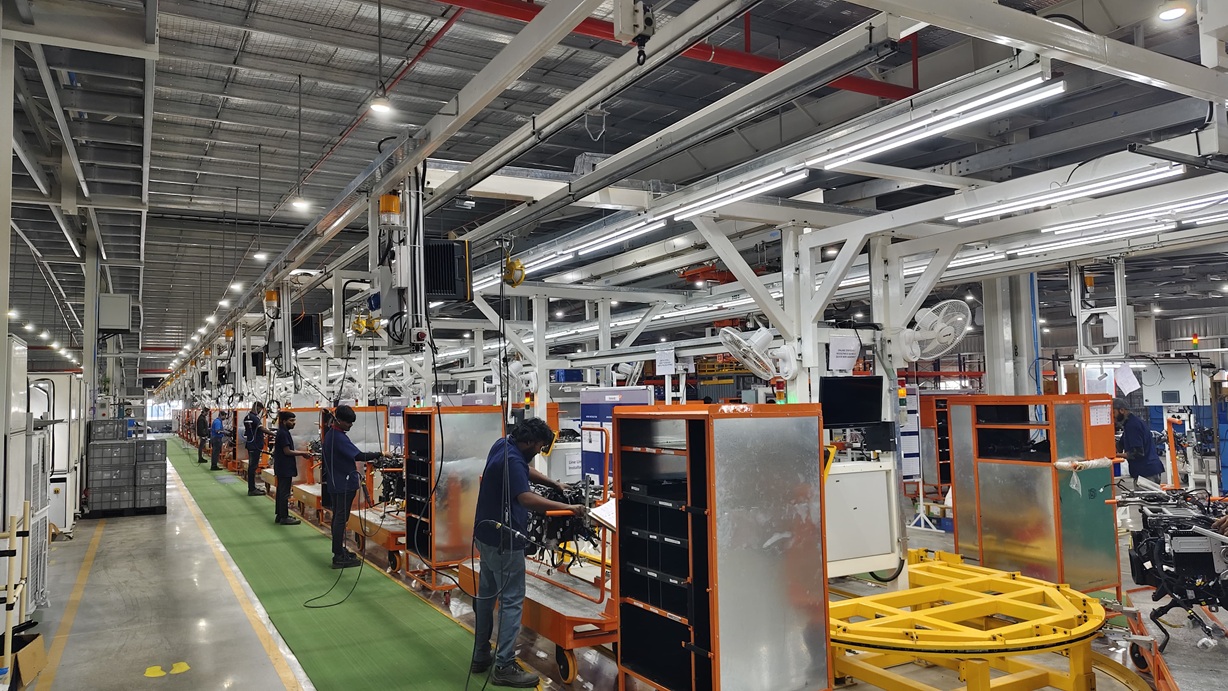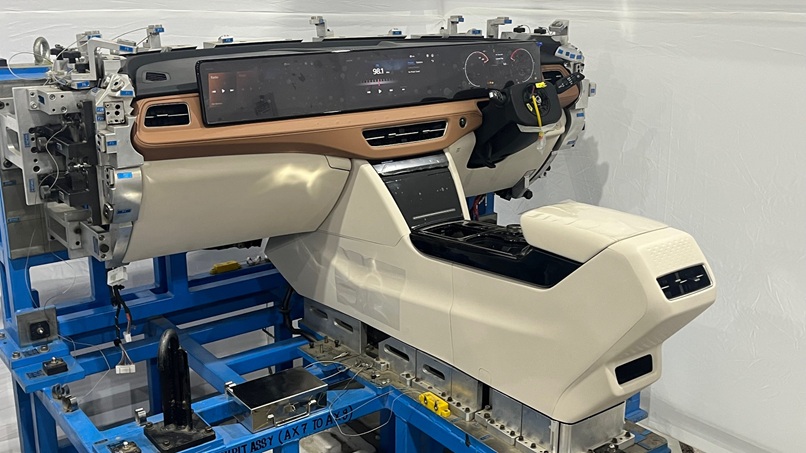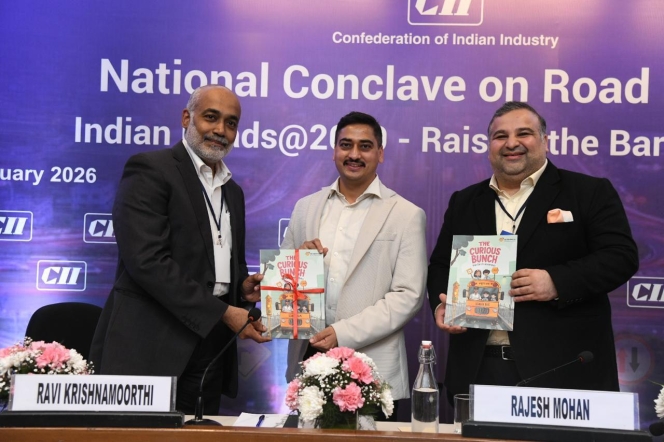India Needs To Invest In Tyre Testing And Labelling Infra: Apollo Tyres CTO
- By Sharad P Matade
- June 22, 2021

The Gurgaon-based tyre major has received accreditation for the wet grip and coast by noise tyre tests on the track. It has already been aggressive in the European market with two manufacturing plants and one R&D centre. With investments, Apollo Tyres is ramping up its testing capabilities to develop tyres for across the segments, including premium passenger, commercial vehicles, high-end motorcycles and off-highway tyres. “The tyre manufacturers are depending on the international labs for advanced characterisation and labelling tests specific to tyres. Thus, investment in both advanced tyre testing as well as labelling infrastructure is needed in this country for quick product development, not only for compliance to latest Indian regulations but also to meet the stringent regulations in other countries and thereby promoting tyre export,” says Daniele Lorenzetti, Chief Technology Officer, Apollo Tyres Ltd in an interview with Motoring Trends.
 Last month, Apollo Tyres became the first Indian tyre manufacturer to get the coveted accreditation from NABL for outdoor labelling tests in India. The company has now been accredited with ISO/IEC 17025 for the wet grip and coast by noise tyre tests on the track. This accreditation is extended for testing different tyre categories for vehicles such as passenger, light truck, commercial (C1, C2 & C3) classes, farm and motorcycle. This testing capability is linked to the Indian government’s plan to implement the ‘Star Rating’ of tyres, in line with the tyre labelling regulation in Europe.
Last month, Apollo Tyres became the first Indian tyre manufacturer to get the coveted accreditation from NABL for outdoor labelling tests in India. The company has now been accredited with ISO/IEC 17025 for the wet grip and coast by noise tyre tests on the track. This accreditation is extended for testing different tyre categories for vehicles such as passenger, light truck, commercial (C1, C2 & C3) classes, farm and motorcycle. This testing capability is linked to the Indian government’s plan to implement the ‘Star Rating’ of tyres, in line with the tyre labelling regulation in Europe.
According to Daniele Lorenzetti, Chief Technology Officer, Apollo Tyres Ltd, the growing focus of the automobile manufacturers on fuel efficiency, higher performance on ride and comfort, and safety is fuelling demand for more tyre component level testing. “Light-weighting in automobiles can alter transfer path for noise and vibration into the cabin, calling for corresponding modification in tyre design. Along with the introduction of AIS 142 standard, similar to EU R117 for labelling of the tyre, huge outdoor testing infrastructure is required, especially in proving grounds,” said Lorenzetti.
Electric Vehicle (EV) related challenges of higher weight, NVH concern, higher torque requirement and subsequent wear rate and battery life would be substantial concerns to tackle during the development process, stated the Apollo Tyres executive. “Similarly, for reducing the number of physical tests, simulation and modal development need to be evolved. Adequate testing infrastructure for validation of simulation and advanced characterisation is also simultaneously required. Hence, more indoor advanced testing infrastructure is required for NVH (Noise, Vibration and Harshness), F&M (Force and Moment) and traction performance validation,” added Lorenzetti.
Today, safety and convenience features are not limited to premium vehicles but are also provided in mid-level and entry-level vehicles, and the same trend is evident in India. Hence, while increasing capability, testing capacity also needs to be enhanced, thinks Lorenzetti.
Indian tyre manufacturers and testing services have basic levels of testing capacity such as safety requirements, durability, braking strength and dimensions. With the Indian government’s NATRIP (National Automotive Testing and R&D Infrastructure Project), vehicle and component level testing facilities have improved. “The tyre manufacturers are depending on the international labs for advanced characterisation and labelling tests specific to tyres. Thus, investment in both advanced tyre testing and labelling infrastructure is needed in this country for quick product development, not only for compliance to latest Indian regulations but also to meet the stringent regulations in other countries and thereby promote tyre export,” explained Lorenzetti.
Like the automobile industry, the tyre industry’s evolution at a broader level depends on economic, social, cultural, technological and climatic changes. The Indian tyre Industry is also evolving with the Indian macro-economic growth, advancements in technology, increasing emphasis on sustainable environmental practices and policy, and institutional and regulatory requirements.
Currently, the tyre industry is going through a highly challenging period, with lockdowns across Indian states owing to the second wave of the Covid-19 pandemic. While this impacts the demand side, pressure on the margin front is also felt due to the rising raw material prices.
 However, with the Indian government’s reinvigorated policies and programmes such as “Atmanirbhar Bharat”, localisation push, EV subsidy, economic stimulus package to thwart pandemic crisis and vehicle scrappage policy, the automotive industry in India is poised to grow at a higher trajectory. “Shift in customer preference to private vehicles from public transport and shared mobility owing to Covid might also generate an uptick. We are optimistic with the and its positive effect on the tyre industry,” said Lorenzetti.
However, with the Indian government’s reinvigorated policies and programmes such as “Atmanirbhar Bharat”, localisation push, EV subsidy, economic stimulus package to thwart pandemic crisis and vehicle scrappage policy, the automotive industry in India is poised to grow at a higher trajectory. “Shift in customer preference to private vehicles from public transport and shared mobility owing to Covid might also generate an uptick. We are optimistic with the and its positive effect on the tyre industry,” said Lorenzetti.
Tyre technology is also evolving in tandem with the automobile industry to pursue higher fuel efficiency, higher performance, driver safety, vehicle stability, light-weighting and heavy load carrying capacity. Additional advanced features such as vehicle connectivity and electrification of functions are also taking place at OEMs, which calls for intelligent talking tyres.
“Unlike in the past, the Indian vehicle market is now fast evolving. Earlier, customers had very few variants/choices available. Now, many models are introduced that call for higher bandwidth of resources. The premium segment is also poised for faster growth, and so comfort, without compromise on traction and durability, is added into the performance requirement list for tyres,” said Lorenzetti.
Indian government’s policies and regulations for sustainable growth are now major drivers for evolution in India. It has already issued a draft notification proposing new tyre norms as a part of the Automotive Indian Standards (AIS) 142:2019. The proposal states that tyres of all cars, buses and trucks shall meet the requirements of rolling resistance, wet grip and rolling sound emissions, in line with the limits of the European regulations.
 Virtual testing is also gaining traction in the auto industry as it saves development time and money and gives flexibility to engineers. Global launches, stiff competition, legal compliance to emissions, demand for more electrification and self-driven vehicles push the development process shorter than ever. The time available for development is becoming shorter and shorter. At the same time, the demands set for the characteristics of a car are becoming increasingly stringent, as is the bandwidth required for various models and variants of vehicles. So, virtual proving is the key to faster product development while tackling tyre testing capacity constraints.
Virtual testing is also gaining traction in the auto industry as it saves development time and money and gives flexibility to engineers. Global launches, stiff competition, legal compliance to emissions, demand for more electrification and self-driven vehicles push the development process shorter than ever. The time available for development is becoming shorter and shorter. At the same time, the demands set for the characteristics of a car are becoming increasingly stringent, as is the bandwidth required for various models and variants of vehicles. So, virtual proving is the key to faster product development while tackling tyre testing capacity constraints.
“However, simulation is as good as its verification and validation. Verification is the process of determining that a model implementation and its associated data accurately represent the developer’s conceptual description and specifications. Validation is the process of determining the degree to which a simulation model and its associated data are an accurate representation of the real world from the perspective of the intended uses of the model. Hence, adequate characterisation testing capability is also simultaneously required for wide-spread application of simulation,” said the CTO of Apollo Tyres.
Apollo Tyres is an Indian company that has been expanding aggressively in the European market. Today, the company has seven manufacturing plants – five in India and two in Europe (Hungary and the Netherlands).
Being a preferred partner for global OEMs, Apollo Tyres is continuously enhancing testing capabilities at its state-of-the-art R&D centres. With the two global R&D centres at Chennai, India and Enschede, Netherlands, the company aims to meet discerning OEM needs. “With the synergies between the two R&D centres, and its advanced testing capabilities, we continuously develop winning products and new technologies while also being at the forefront of meeting new regulatory requirements,” said Lorenzetti.
 The company’s extensive investments in tyre testing not only help it in developing tyres for premium luxury passenger and commercial vehicles but also high-end motorcycles and off-highway tyres (OHT). “At our R&D centre, characterisation capabilities are continuously developed for the determination of traction, NVH, F&M, ride and handling, comfort, tread wear, fuel efficiency, durability and footprint,” added Lorenzetti.
The company’s extensive investments in tyre testing not only help it in developing tyres for premium luxury passenger and commercial vehicles but also high-end motorcycles and off-highway tyres (OHT). “At our R&D centre, characterisation capabilities are continuously developed for the determination of traction, NVH, F&M, ride and handling, comfort, tread wear, fuel efficiency, durability and footprint,” added Lorenzetti.
Automotive test centres with large proving grounds funded by the Indian government are already evolved in India. Its NATRIP project aims to create core global competencies in the automotive sector in India by facilitating seamless integration of the Indian automotive industry with the world through setting up of state-of-the-art automotive testing, homologation and R&D infrastructure facilities.
Collaborations at various levels are also taking place to further enhance the vehicle test centres to tyre-specific test facilities. Earlier, Apollo collaborated with one of the test centres of the Indian government to pioneer the indigenisation of tyre labelling and certification tests in India. Similar collaboration would be beneficial for the industry to evolve faster.
“While large vehicle OEMs have their own limited proving grounds, the massive investment and maintenance requirement for this kind of infrastructure may be challenging for tyre companies to set up. Though collaboration among leading tyre companies would be a welcome scenario, the scale and size of the industry need to be evolved for such a tie-up,” said Lorenzetti.
The EV segment brings its own challenges with the higher weight of vehicles, NVH concern due to fewer and lesser noisy components, higher torque requirement and subsequent wear rate, and battery life. Apollo Tyres is gearing up for the same with capital intensive testing facilities such as “flat track” for traction, F&M tests and hemi-anechoic chamber for NVH tests. Apollo Tyres’ test machines are specially designed with multiple features, such as the very high torque ramp-up rate to match the futuristic EV requirements.
“It is heartening to note that major premium OEMs wholeheartedly partner with Apollo Tyres for joint development of products, featuring advanced technologies and engineering. We are committed in our endeavour to be the trusted partner for our esteemed customers and society at large by enhancing value with best-in-class efficiency through sustainable models for environment conservation,” said Lorenzetti. (MT)

- IAC India
- Lumax Group
- IAC Group
- Mahindra
- VECV
- Maruti Suzuki India
- Skoda
- Volkswagen
- Stellantis
- Sunil Koparkar
IAC India Bets On Engineering Depth & Diversification, Targets 20% CAGR Growth Till FY2030
- By Nilesh Wadhwa
- February 28, 2026

Sunil Koparkar, Managing Director, IAC India, outlines the company’s strategy to reduce customer concentration, expand exports and leverage group synergies following its integration with the Lumax Group.
As India’s automotive interior market evolves towards premiumisation, localisation and faster product cycles, IAC India, part of the Lumax Group, is repositioning itself beyond a single-customer dependency model – without diluting its core partnerships.
IAC India continues to derive a significant share of its revenue from Mahindra’s passenger vehicle business. While the concentration remains high, Koparkar is clear that diversification will be driven through growth rather than dilution.
“Mahindra will always be our primary customer. We have a very strong strategic partnership. But we are also working on expanding with other OEMs and in the commercial vehicle space. Our goal remains a 20 percent CAGR,” he says.
For FY2025, IAC India USD 140 million in revenue, and is targeting a 20 percent growth in FY2026. The company counts Mahindra as its primary customer with almost 78 percent of its business coming from them, while Maruti Suzuki India (12%), Volvo Eicher Commercial Vehicles (5%), Skoda-Volkswagen (3%) and Stellantis (1%) contribute towards the remaining business.
 What’s more, responding to the company’s expansion plans, Koparkar revealed, that IAC Group, in addition to introducing new products, is also in talks with new-age players who have just entered Indian market (and also planning too) for supplying products.
What’s more, responding to the company’s expansion plans, Koparkar revealed, that IAC Group, in addition to introducing new products, is also in talks with new-age players who have just entered Indian market (and also planning too) for supplying products.
Currently, passenger vehicles account for roughly 90 percent of the business, with commercial vehicles forming the balance. Value-wise, Koparkar expects CV contribution to rise, even if percentage splits remain broadly similar due to the rapid growth of PV volumes.
Responding to a query on the potential growth from the CV segment, Koparkar said, “There is clear potential in CV interiors. As the CV market moves towards more comfortable cabins — with features like airbags, HVAC and infotainment — the opportunity for interior suppliers increases. Through Volvo Eicher, we have already helped drive that trend in India.”
When asked about the company’s expansion plans, Koparkar also stated that IAC Group is open to expanding to new regions as it aims to operate closer to its customers. One of the potential new projects for the company could very well be Chennai, as the company is in early talks with a new CV customer as well as VinFast.
Engineering as a Standalone Growth Lever
A key pillar of IAC India’s strategy is its expanding engineering capability. The company has been scaling up its R&D and product development team and increasingly positioning engineering services as a distinct revenue stream.
The company at present, employs over 300 engineers in India, which it aims to scale it upto 400-plus by next year and 500-plus in the coming few years.

Historically, the Indian Engineering Centre supported the global IAC Group. “We were primarily the IAC Group engineering development centre. We will continue to provide those services. But now, besides global support, we are also offering engineering services to local OEMs,” Koparkar explains.
These services span studio collaboration, basic product design, CAE analysis and prototype development. In some cases, this can potentially evolve into full-scale supply programmes.
Importantly, innovation is now being formalised locally. “This year alone, we are in the process of filing about 30 patents,” he says. Earlier, intellectual property was subsumed under the global entity; now, filings are being initiated in India.
R&D investment remains aligned with group benchmarks at around 1.5–2 percent of revenue.
Exports: Measured Ambition
In terms of export potential, it currently contributes less than 5 percent towards the revenue, primarily through smaller kinematic parts. Direct exposure to the US market is negligible.
“Tariff-related uncertainty does not affect us because we do not export to the US,” Koparkar says. “Logistically, it does not make sense to ship our large interior parts there.”
Europe remains the primary export target. “The opportunity lies in leveraging our design capabilities and local development strengths. If logistics can be managed efficiently, there is room to grow.”
He also sees the Lumax Group’s aftermarket division as a future vehicle for export expansion.
Localisation and Supply Chain Resilience
On the localisation front, IAC India has made significant progress. “Last year was the first time we were able to localise over 99 percent of our tooling and development in India,” Koparkar states. Machinery on shop floors is largely localised, with only certain raw materials still imported.
The semiconductor crisis, he adds, had minimal direct impact. “We do not source electronics for our products — that is handled by the customer. However, from a development perspective, we are evaluating secondary substitutes for imported components, so we are prepared in case of disruptions.”
Premiumisation, Sustainability and AI
Premiumisation is currently the dominant interior trend. “Customers are moving away from basic plastics to more premium-feel interiors. Electronification is a big driver,” Koparkar says.
Sustainability, however, remains nascent in India. “There is no specific push for sustainable materials yet. What OEMs are looking for is lightweighting to meet upcoming CAFE norms. If a sustainable material delivers significant weight reduction, then it becomes serious.”

He points to jute, coir and bamboo fibres as potential alternatives but stresses that ecosystem-level collaboration is essential. “Unless a circular economy develops around us, sustainable materials will struggle to scale.”
On automation, operations across IAC’s six plants are roughly a 50:50 mix of automated and manual processes, depending on volume justification. Cobots and semi-automation are used where full automation does not offer viable returns.
AI, meanwhile, is expected to influence design more than manufacturing. “We see AI helping us accumulate design learnings and reduce design cycle times. Its impact will be more visible in engineering services than on the shop floor.”
Faster Development Cycles
Product life cycles are shrinking rapidly. “It used to take five years to develop a car,” Koparkar reflects. “With the XUV700, we worked with the customer to shrink that to 42 months. EVs are being developed even faster.”
As development timelines compress and interiors become more technology-intensive, IAC India is betting on engineering depth, localisation strength and group synergies to sustain its 20 percent growth ambition – while steadily broadening its customer and geographic footprint
- Rosmerta Technologies
- The Curious Bunch
- CII National Conclave on Road Safety
- Dr Rajesh Mohan
- Ravi Krishnamoorthi
- road safety
Rosmerta Launches Road Safety Comic Book For Schools
- By MT Bureau
- February 27, 2026

Rosmerta Technologies has launched a comic book titled ‘The Curious Bunch’ at the 3rd Edition of the CII National Conclave on Road Safety. The publication is designed to introduce road safety awareness to children.
The initiative aligns with the Government of India’s ‘4E’ strategy for road safety, which focuses on Engineering, Education, Enforcement and Emergency Care. The comic book aims to address the 168,000 road fatalities reported in India in 2022 by fostering safe habits at a school level.
The comic book uses illustrations to present road scenarios, including pedestrian conduct, school bus safety, traffic signals & the use of helmets, seatbelts and child restraint systems. By educating children, the company intends to influence the behaviour of parents and the wider community.
Rosmerta, a provider of mobility solutions, currently operates technology systems for automated driving tests and AI-based monitoring. The launch of ‘The Curious Bunch’ marks an expansion of its activities into the education pillar of the national safety framework.
Dr Rajesh Mohan, DCP, Gurugram Traffic, said, “When we educate children and instil strong moral and ethical values, the impact travels far beyond the classroom. Children naturally share what they learn. They question, they explain, and they influence conversations at home. In many ways, they become powerful advocates, encouraging their parents to be more aware, more responsible, and more engaged. Over time, this awareness translates into action, because parents are also drivers, commuters, and decision-makers on the road.”
Ravi Krishnamoorthi, Group President, Rosmerta Technologies, said, “Every road accident statistic hides a parent’s anxiety. In 2022 alone, India reported over 168,000 road accident fatalities, according to government data. Road safety is not merely about compliance; it is about compassion and collective responsibility. When a child understands why a red light matters or why a helmet can save a life, they don’t just learn a rule - they become ambassadors of safety within their families and communities. Through ‘The Curious Bunch’, we aim to nurture this awareness early, because the habits we shape in children today will define the safety culture of our nation tomorrow.”
- Maruti Suzuki India
- Transport Department of Tamil Nadu
- Automated Driving Test Tracks
- ADTT
- M K Stalin
- RTO
- CMVR
- Rahul Bharti
Maruti Suzuki Commissions Seven Automated Driving Test Tracks In Tamil Nadu
- By MT Bureau
- February 27, 2026
Maruti Suzuki India, in partnership with the Transport Department of Tamil Nadu, has announced the commissioning of seven Automated Driving Test Tracks (ADTTs) in the state. The facilities were inaugurated by the Chief Minister of Tamil Nadu, M K Stalin.
The tracks are located at Regional Transport Offices (RTOs) in Coimbatore (Central), Tiruvannamalai, Krishnagiri, Madurai (North), Sivagangai, Dindigul, and Tiruchirappalli (West). These sites form part of a Memorandum of Agreement to automate ten tracks across the state, with the remaining three at Tirunelveli, Tuticorin and Marthandam scheduled for operation shortly.
The ADTTs are designed to evaluate applicants for two-wheeler and Light Motor Vehicle (LMV) licences. The system removes human intervention from the evaluation process to ensure objective testing according to the Central Motor Vehicle Rules (CMVR).
Key technical components include:
- Video Analytics: High-definition cameras to monitor vehicle movement and path adherence.
- Sensors: Radio Frequency Identification (RFID) and Harnessing AutoMobiles for Safety (HAMS) technology.
- Identification: Face-recognition systems to verify candidate identity.
- Results: Integrated IT systems that generate test results automatically based on real-time data.
The carmaker has commissioned 56 ADTTs across eight states, including Uttar Pradesh, Delhi, and Bihar. Following the completion of agreements with Rajasthan and Andhra Pradesh, the company’s footprint is expected to reach 81 tracks nationwide.
Rahul Bharti, Senior Executive Officer, Corporate Affairs, Maruti Suzuki India, said, “As part of Maruti Suzuki’s road safety initiatives implemented across multiple states, we are partnering with the Government of Tamil Nadu to strengthen the driver licensing evaluation process through the deployment of 10 Automated Driving Test Tracks (ADTTs). Equipped with high-definition cameras and advanced analytics, these ADTTs enable a comprehensive, efficient, and transparent assessment process. It eliminates any human bias and ensures that only skilled drivers are awarded a license.”
“According to data shared by the Ministry of Road Transport & Highways, India witnessed 1.77 lakh road accident deaths in 2024. Promoting disciplined driving practices and ensuring rigorous driver evaluation are vital to prevent road accidents and augment road safety across the country,” he said.
BYD To sponsor BVRLA Annual Dinner 2026
- By MT Bureau
- February 26, 2026

BYD, the world’s leading manufacturer of New Energy Vehicles, will once again serve as the headline sponsor for the British Vehicle Rental and Leasing Association (BVRLA) Annual Dinner in 2026. This marks the third consecutive year the company has supported the prestigious event, which is set to take place on 4 March 2026 at the JW Marriott Grosvenor House Hotel on Park Lane, London. The dinner is widely recognised as the premier gathering for professionals across the rental, fleet management and leasing sectors.
Through its ongoing sponsorship since 2024, BYD reaffirms its commitment to this vital segment of the UK automotive market. The company’s expanding presence was underscored in 2025 by the introduction of several new models, including the SEALION 7, DOLPHIN SURF, SEAL 6 Saloon and Touring and the ATTO 2. These launches contributed to significant sales figures, with 21,824 units delivered to fleet customers and 5,964 to the rental sector. The momentum has continued into 2026 with the debut of the SEALION 5 DM-i, while the ATTO 2 DM-i and ATTO 3 EVO are expected to arrive shortly. Supporting this growth is a dedicated UK fleet team of 11 specialists, offering tailored product and service expertise.
The BVRLA represents around 1,000 member organisations, ranging from SMEs to large public companies, all operating within or alongside the UK’s vehicle rental and leasing industries. By engaging with government and upholding professional standards, the association enables its members to provide safe, sustainable and accessible transport solutions. This year’s Annual Dinner will feature the presentation of the Industry Hero Awards and live entertainment from award-winning comedian Tom Ward, celebrating excellence across the sector.






Comments (0)
ADD COMMENT